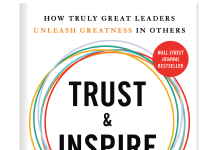Mastercard aimed to build a world-class culture with decency at its core, where feedback happens on a continual basis—a formed habit based on leveraging the one common element across the organization: the Development Card tool, one simple card that captures an employee’s personalized actions plans to help build skills and achieve his or her career goals. This also played into another strategic goal, that of securing Mastercard’s future by culling trends via artificial intelligence (AI) of what employees were stating as skills and action plans—this is used to help strategize and develop a keen focus on organizational skills needs for 2020 and beyond for Learning & Development.
Program Details
To truly develop and foster a culture with decency at its core, Mastercard determined the best way to show its commitment to people development was through action.
Decency at its core for the company is about a culture of feedback and continuous learning—it is about trust, candor, and consistency. Mastercard wanted everyone to understand where they stood and where to focus their attention—and to trust that manager feedback is intended to support them on their development journey. Hence, the Development Card was deployed. In addition to capturing an employee’s personalized careeer action plans, it serves as a vehicle to leverage for feedback conversations throughout the year.
Everyone uses the same template, which is placed for easy access and capture into Mastercard’s HR system of record, Workday. Elements of the card include:
- Current Position
- Tenure
- Work Location
- Education
- Mobility (capture of short- or long-term preference for movement into another region of the world)
- Work Summary
- Strengths—what to build on
- Development Areas—where to focus
- Development Actions
- Career Aspirations
This initiative impacted the entire global workforce at Mastercard. A comprehensive campaign was developed to reach everyone. However, it was done with guerilla marketing tactics by hitting specific audiences on a rollout schedule that planted consistent messaging supporting a culture of continuous feedback.
1. A Website was developed to house all elements of the campaign from:
a. Entertaining and informative videos on how to have a great development conversation
b. Crafting one’s development actions
c. Preparing for development conversations (separate guides for managers and employees)
d. Carefully designed Career Development Pathways in Degreed
e. A Workday Guide for Development Cards
f. Comprehensive FAQs
2. Webcasts were:
a. Held with HR Business Partners around the world prior to the global launch to ensure they were equipped with a consistent messaging approach about fostering a culture of continuous feedback with their respective business units using the Development Card tool.
b. Specifically held with Mastercard’s People Manager population to not only inform and showcase the Career Development Conversation Website, but to guide them on leveraging the Development Card tool to facilitate transparent and effective conversations—one globally consistent tool both the manager and the employee can count on as a jumping-off point for all subsequent feedback conversations.
c. Held for the global population to inform, showcase, and reinforce why the Development Card is a tool that will be used to start and continue transparent career development conversations.
3. All communication channels—including Webcasts, digital kiosks, main Mastercard communication Hub, local kiosks, executive e-mail reinforcements—were utilized to ensure every employee heard, understood, and knew the importance of leveraging the Development Card tool as the basis for feedback conversations with their managers.
The data is captured in Mastercard’s HR system, Workday, but the company would have to literally comb through more than 15,000 employee cards to unveil skills trends based on employees’ developmental actions and to see if there are trends among career aspirations. Instead, Mastercard is leveraging its internal AI subject matter experts to have AI sift through the data inputs to reveal insights that will feed into the L&D 2020 skills development strategy.
Prior to launch, MasterCard partnered with an external ad agency to come up with a consumer-grade marketing and branding campaign to raise awareness and encourage all employees to partake in this initiative. One example includes designing coffee mugs with images to encourage managers and employees to discuss their careers over a cup of coffee. Close to 3,000 mugs were distributed across the organization.
In addition, a series of internal electronic bulletin boards were published to emphasize the importance of development conversations over this critical period. The internal communications team also eveloped a campaign centered on employees with unique careers inside and outside of Mastercard. This reinforced the importance of how Development Cards can help with career aspirations and to encourage employees to think about careers laterally versus vertically.
Finally, e-mail reminders targeted managers who had yet to create a Development Card. These reminders were sent from numerous sources, including system-led e-mails from senior leaders and reminders from HR business partners.
Results
Although this initiative was not mandated, Mastercard reports that 99 percent of employees (up from 0 percent at the start) and 100 percent of HR used the Development Card to commence feedback conversations and develop action plans to meet or exceed their career aspirations.
Training materials related to Development Cards have become some of the company’s most viewed content. More than 9,000 employees leverage the card training resources. As a result of these efforts, 77 percent of employees feel they have opportunities for development and growth at Mastercard—a 4 percent increase from the previous year.




